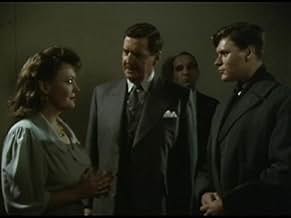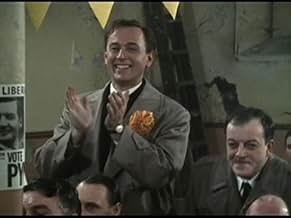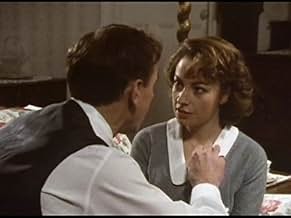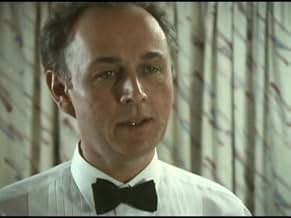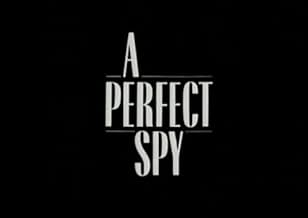A Perfect Spy
- TV Mini Series
- 1987
- 6h 14m
IMDb RATING
7.3/10
1.1K
YOUR RATING
The rise and fall of Magnus Pym and his career through intelligence. From chance meetings with people will be important to him in the future to a life in Czechoslovakia, Pym weaves his way t... Read allThe rise and fall of Magnus Pym and his career through intelligence. From chance meetings with people will be important to him in the future to a life in Czechoslovakia, Pym weaves his way through the complicated world of espionage.The rise and fall of Magnus Pym and his career through intelligence. From chance meetings with people will be important to him in the future to a life in Czechoslovakia, Pym weaves his way through the complicated world of espionage.
- Nominated for 2 Primetime Emmys
- 1 win & 6 nominations total
Browse episodes
Featured reviews
This is an extremely long movie, which means you may become very bored before it becomes interesting, but its length provides opportunity for its characters to find permanent attachment in your sympathies.
If you are moved by the guilt of the loathsome you will find it particularly heart-wrenching, because it is a story that finds its heroes among the evil and the weak. If you can love a monster you'll cry for Magnus Pym, the spy who betrays everyone - notably his country, his friends and family - a man who has also been manipulated and moulded since childhood by those same people.
There isn't one truly likeable character in the entire story, not one loyal, 'moral' personality to sympathise with. But watching the whole thing without the help of a tissue would be quite remarkable.
I really enjoyed it in the end. Well worth it for people who like inciteful movies about baser human character.
If you are moved by the guilt of the loathsome you will find it particularly heart-wrenching, because it is a story that finds its heroes among the evil and the weak. If you can love a monster you'll cry for Magnus Pym, the spy who betrays everyone - notably his country, his friends and family - a man who has also been manipulated and moulded since childhood by those same people.
There isn't one truly likeable character in the entire story, not one loyal, 'moral' personality to sympathise with. But watching the whole thing without the help of a tissue would be quite remarkable.
I really enjoyed it in the end. Well worth it for people who like inciteful movies about baser human character.
Without doubt the best of the novels of John Le Carre, exquisitely transformed into a classic film. Performances by Peter Egan (Magnus Pym, The Perfect Spy), Rudiger Weigang (Axel, real name Alexander Hampel, Magnus' Czech Intelligence controller), Ray McAnally (Magnus' con-man father) and Alan Howard (Jack Brotherhood, Magnus' mentor, believer and British controller), together with the rest of the characters, are so perfect and natural, the person responsible for casting them should have been given an award. Even the small parts, such as Major Membury, are performed to perfection. It says a lot for the power of the performances, and the strength of the characters in the novel that, despite the duplicity of Magnus, one cannot help but feel closer to Magnus and Axel than to Jack Brotherhood and the slimy Grant Lederer of U.S. Intelligence. I have read the book at least a dozen times, and watched the movie almost as many times, and continue to be mesmerized by both. If I had one book to take on a desert island, A Perfect Spy would be the choice above all others.
There is a brilliant lesson of sorts here about narrative depth, but you must know the book. Lavishly conceived by Le Carre as his magnum opus, the book is not any other spy thriller you picked up on an airport, it's one of the most tantalizing I know. The center is this, a mysterious man, posing as someone else, is holed up in a small room in Dorset overlooking the ocean and recalls a whole journey through life.
The childhood stream-of-consciousness where he attempts to be Faulkner without conquering the madness doesn't work; so much else does. It has a strong sense of presence in several places from Greek islands to Washington, the center of control. It has a sense of anxious premonition about the extents of control. It has a narrator writing a memoir while efforts are underway to apprehend him before he defects to the other side. It has several relationships of ambiguous love defined in his imagination. It has a disappearance in the middle of the night and a strange encounter in a Czech barn.
This, it just won't do.
The most glaring fault by far is that they simplified the structure, making it a linear telling in one go (practically). The childhood segment works even less because when seen, it loses the shroud of memory. Seeing Rick is never going to be as powerful as sensing him move through room's of the son's memory. It still covers most of the narrative ground but we lose the premonition, we lose the mystifying sense of machinery set in motion long ago and discovered only when the ground beneath our feet shifts, we lose the depth of the betrayal of love. We lose it all and get a nicely groomed play. Its idea of profound emotion is actors grimacing in close up; I was stunned to see that it's from the late 80s, it looks 20 years older.
I don't know if this is watchable fiction, maybe it is, but it's a complete catastrophe where it should go beyond it and give us lives, contact, sense, everything Le Carre strove to have it slide through portals of remembrance is reduced to the Cliff notes version.
But something weird happens. To see this and to have known the book is to have images of something I've known as deeper, more elusive, more rending and this, for me, was to recall even the book as deeper than Le Carre managed with words. A powerful scene in the film exemplifies just this, when his wife, alarmed by events, begins to read an unfinished manuscript he's left behind, ostensibly a novel he's writing (he says), but she suspects it's more, we know it's more, it's the disguised recollections of a lifetime (this is completely flattened in this linear telling).
She cries as she reads about betrayal as hope, as salvation, as an adventure for the imaginative soul, but oh how much more maddeningly full is the life behind the words. His wife, his mentor in the service, will they ever truly know? To know this is to realize how much we won't truly know in turn. There's only so much you can say and so easy to misunderstand. What Le Carre doesn't put to words around this life deserves its Tarkovsky film.
The childhood stream-of-consciousness where he attempts to be Faulkner without conquering the madness doesn't work; so much else does. It has a strong sense of presence in several places from Greek islands to Washington, the center of control. It has a sense of anxious premonition about the extents of control. It has a narrator writing a memoir while efforts are underway to apprehend him before he defects to the other side. It has several relationships of ambiguous love defined in his imagination. It has a disappearance in the middle of the night and a strange encounter in a Czech barn.
This, it just won't do.
The most glaring fault by far is that they simplified the structure, making it a linear telling in one go (practically). The childhood segment works even less because when seen, it loses the shroud of memory. Seeing Rick is never going to be as powerful as sensing him move through room's of the son's memory. It still covers most of the narrative ground but we lose the premonition, we lose the mystifying sense of machinery set in motion long ago and discovered only when the ground beneath our feet shifts, we lose the depth of the betrayal of love. We lose it all and get a nicely groomed play. Its idea of profound emotion is actors grimacing in close up; I was stunned to see that it's from the late 80s, it looks 20 years older.
I don't know if this is watchable fiction, maybe it is, but it's a complete catastrophe where it should go beyond it and give us lives, contact, sense, everything Le Carre strove to have it slide through portals of remembrance is reduced to the Cliff notes version.
But something weird happens. To see this and to have known the book is to have images of something I've known as deeper, more elusive, more rending and this, for me, was to recall even the book as deeper than Le Carre managed with words. A powerful scene in the film exemplifies just this, when his wife, alarmed by events, begins to read an unfinished manuscript he's left behind, ostensibly a novel he's writing (he says), but she suspects it's more, we know it's more, it's the disguised recollections of a lifetime (this is completely flattened in this linear telling).
She cries as she reads about betrayal as hope, as salvation, as an adventure for the imaginative soul, but oh how much more maddeningly full is the life behind the words. His wife, his mentor in the service, will they ever truly know? To know this is to realize how much we won't truly know in turn. There's only so much you can say and so easy to misunderstand. What Le Carre doesn't put to words around this life deserves its Tarkovsky film.
I clearly missed the joke behind this series. How does a man so gullible climb his way through the ranks of British intelligence? Maybe that was Le Carré's point; that any idiot could have been "a spy" during the cold war, and that it was exactly his stupidity that kept him unwittingly "under the radar"...Either way, I came away feeling extremely annoyed at the end.
This is without doubt my favourite Le Carre novel and it is transformed to the silver screen with all the love and care one could wish for. I read a review on this site that seems to find the characters loathsome but I believe this misses the point. All Le Carre stories are essentially love stories and this is no exception. It is an accurate reflection of the period in which it is set. Betrayal is the key by everybody for the good of nobody. Pym upbringing is so close to my own that I find it chilling watching. Peter Egan is in his finest role and the late lamented Ray McAnally is unbelievably good. Even the smallest roles played by such as Andy de la Tour, Tim Healy and Jack Ellis are spot on. This cast is a Theatre Impresario's Dream. The Story should not be spoiled by ill informed description but suffice it to say it relates to a young mans slow but inexorable destruction and descent into espionage and treason. All my sympathies lie with Magnus Pym and his sole (non sexual) love for Poppy (Rüdiger Weigang-as wonderful as always. His only true friendship but also by definition another in the long line of betrayals. OUTSTANDING! Rent it, buy it. love it.
Did you know
- TriviaAccording to source novelist John le Carré, the character of Rick Pym (Ray McAnally) is heavily based upon his own father.
- ConnectionsFeatured in Wogan: Episode #9.10 (1989)
- How many seasons does A Perfect Spy have?Powered by Alexa
Details
- Release date
- Country of origin
- Language
- Also known as
- John le Carré's A Perfect Spy
- Production companies
- See more company credits at IMDbPro
Contribute to this page
Suggest an edit or add missing content







